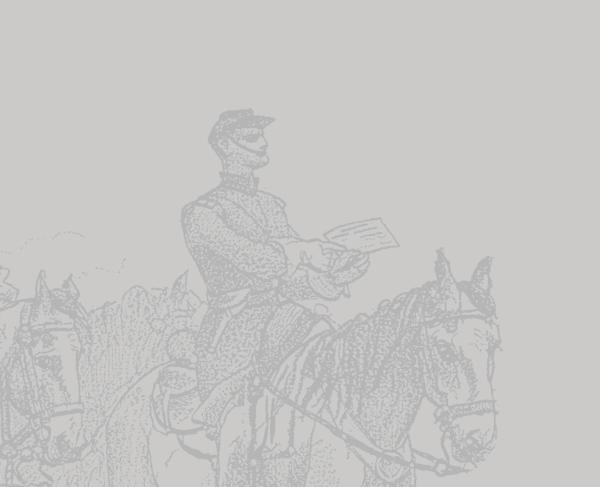Rocky Face Ridge

SAM WATKINS, 1st Tennessee
When I got back to Dalton, I found the Yankee army advancing; they were at Rocky Face Ridge. Now, for old Joe's generalship. We have seen him in camp, now we will see him in action. We are marched to meet the enemy; we occupy Turner's Gap at Tunnel Hill. Now, come on, Mr. Yank—we are keen for an engagement. It is like a picnic; the soldiers are ruddy and fat, and strong; whoop! whoop! hurrah! come on, Mr. Yank. We form line of battle on top of Rocky Face Ridge, and here we are face to face with the enemy. Why don't you unbottle your thunderbolts and dash us to pieces? Ha! here it comes; the boom of cannon and the bursting of a shell in our midst. Ha! ha! give us another blizzard! Boom! boom! That's all right, you ain't hurting nothing.
"Hold on, boys," says a sharpshooter, armed with a Whitworth gun, "I'll stop that racket. Wait until I see her smoke again." Boom, boom! the keen crack of the Whitworth rings upon the frosty morning air; the cannoneers are seen to lie down; something is going on. "Yes, yonder is a fellow being carried off on a litter." Bang! bang! goes the Whitworth, and the battery is seen to limber to the rear. What next? a yell! What does this yell mean? A charge right up the hill, and a little sharp skirmish for a few moments. We can see the Yankee line. They are resting on their arms. The valley below is full of blue coats, but a little too far off to do any execution.
Old Joe walks along the line. He happens to see the blue coats in the valley, in plain view. Company H is ordered to fire on them. We take deliberate aim and fire a solid volley of minnie balls into their midst. We see a terrible consplutterment among them, and know that we have killed and wounded several of Sherman's incendiaries. They seem to get mad at our audacity, and ten pieces of cannon are brought up, and pointed right toward us. We see the smoke boil up, and a moment afterwards the shell is roaring and bursting right among us. Ha! ha! ha! that's funny— we love the noise of battle. Captain Joe P. Lee orders us to load and fire at will upon these batteries. Our Enfields crack, keen and sharp; and ha, ha, ha, look yonder! The Yankees are running away from their cannon, leaving two pieces to take care of themselves. Yonder goes a dash of our cavalry. They are charging right up in the midst of the Yankee line. Three men are far in advance. Look out, boys! What does that mean? Our cavalry are falling back, and the three men are cut off. They will be captured, sure. They turn to get back to our lines. We can see the smoke boil up, and hear the discharge of musketry from the Yankee lines. One man's horse is seen to blunder and fall, one man reels in his saddle, and falls a corpse, and the other is seen to surrender. But, look yonder! the man's horse that blundered and fell is up again; he mounts his horse in fifty yards of the whole Yankee line, is seen to lie down on his neck, and is spurring him right on toward the solid line of blue coats. Look how he rides, and the ranks of the blue coats open. Hurrah for the brave rebel boy! He has passed and is seen to regain his regiment. I afterwards learned that that brave Rebel boy was my own brother, Dave, who at that time was not more than sixteen years old. The one who was killed was named Grimes, and the one captured was named Houser, and the regiment was the First Tennessee Cavalry, then commanded by Colonel J. H. Lewis. You could have heard the cheers from both sides, it seemed, for miles.
John Branch raised the tune, in which the whole First and Twenty-seventh
Regiments joined in:
"Cheer, boys, cheer, we are marching on to battle!
Cheer, boys, cheer, for our sweethearts and our wives!
Cheer, boys, cheer, we'll nobly do our duty,
And give to the South our hearts, our arms, our lives.
Old Lincoln, with his hireling hosts,
Will never whip the South,
Shouting the battle cry of freedom."
All this is taking place while the Yankees are fully one thousand yards off. We can see every movement that is made, and we know that Sherman's incendiaries are already hacked. Sherman himself is a coward, and dares not try his strength with old Joe. Sherman never fights; all that he is after is marching to the sea, while the world looks on and wonders: "What a flank movement!" Yes, Sherman is afraid of minnie balls, and tries the flank movement. We are ordered to march somewhere.

